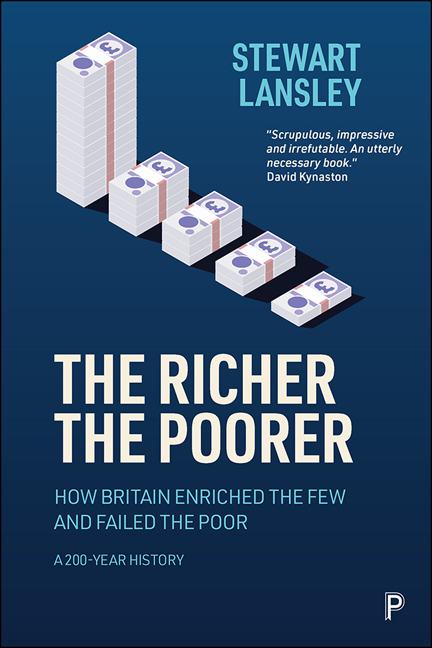Book contents
- Frontmatter
- Miscellaneous Frontmatter
- Dedication
- Epigraph
- Contents
- List of figures
- Preface and acknowledgements
- Introduction: Knighthoods for the rich, penalties for the poor
- PART I 1800–1939
- PART II 1940–59
- PART III 1960–79
- PART IV 1980–96
- PART V 1997–2010
- PART VI 2011–20
- Afterword: COVID-19 and ‘the polo season’
- Notes
- Index
2 - Britain’s gilded age
Published online by Cambridge University Press: 13 May 2022
- Frontmatter
- Miscellaneous Frontmatter
- Dedication
- Epigraph
- Contents
- List of figures
- Preface and acknowledgements
- Introduction: Knighthoods for the rich, penalties for the poor
- PART I 1800–1939
- PART II 1940–59
- PART III 1960–79
- PART IV 1980–96
- PART V 1997–2010
- PART VI 2011–20
- Afterword: COVID-19 and ‘the polo season’
- Notes
- Index
Summary
A vast gulf in living standards prevailed through and beyond the Victorian era. ‘There is ignorance, and coarse brutality, and sullen hopelessness, and haggard wretchedness, far beyond what there ought to be in the midst of such beauties and blessings’, declared Elizur Wright, an American businessman and social reformer. Visiting Britain on a fact-finding journey a decade after the Poor Law Amendment Act, Wright was unimpressed by the rich classes. Meeting the elderly and influential romantic poet, William Wordsworth, who had drifted from the radicalism of his younger days, Wright argued firmly against the poet's belief that America, like Britain, should have ‘a class of gentlemen … born to such large property that they could devote themselves entirely to literary pursuits, and be above sordid interests’. ‘The longer I stay here’, declared Wright, ‘the more this class of independent hereditary gentlemen seems to me like a perpetual devouring curse of locusts.’
While the data sources are imperfect, the evidence is that the UK income gap widened through the first six decades of the nineteenth century. Real wages rose slowly in the last decades of the Victorian era, while the income gap narrowed slightly. Industrial capitalism produced vast wealth, but only for the few, creating a wealth gap that was even greater than that for incomes. In 1859, the wealthiest sixty-seven estates accounted for 22 per cent of all property left in that year. On the death of Queen Victoria in 1901, the top 1 per cent owned an estimated 70 per cent of all private property –land, property and financial assets –while the top tenth owned 93 per cent. The vast majority owned more or less nothing.
Extractive capitalism
Victorian political ideology embraced the same survival-of-the-fittest social Darwinism that helped to drive the runaway personal fortunes being amassed across the Atlantic, even if wealth in the United States was then slightly less unequally distributed than in the UK. For some, the towering riches being accumulated were a just reward ‘for the United States becoming the richest and mightiest nation’. For others, the new tycoons were dismissed as ‘robber barons’ for their ruthless industrial tactics and the harsh conditions they imposed on workers.
- Type
- Chapter
- Information
- The Richer, the PoorerHow Britain Enriched the Few and Failed the Poor: A 200-Year History, pp. 17 - 26Publisher: Bristol University PressPrint publication year: 2021



